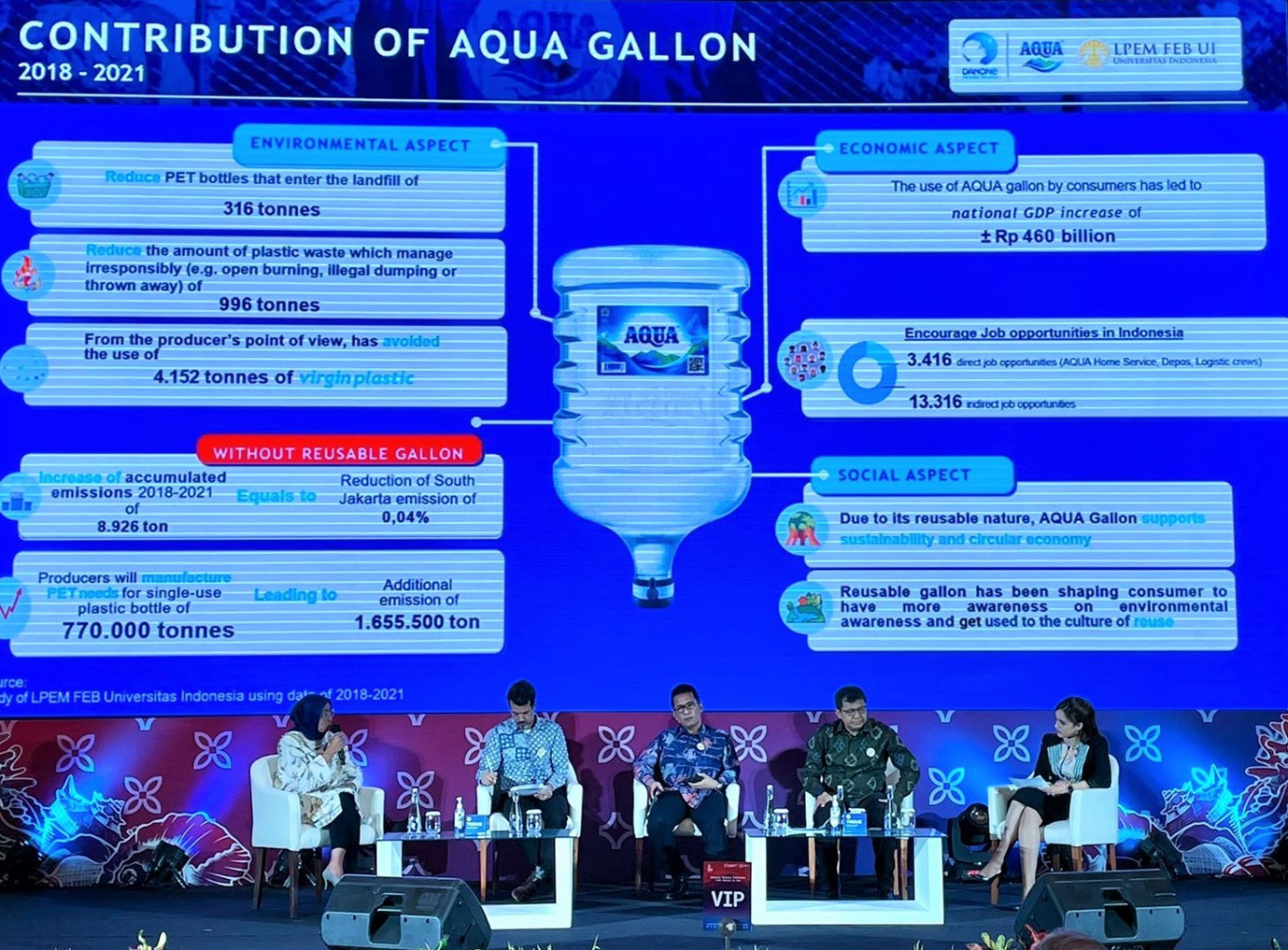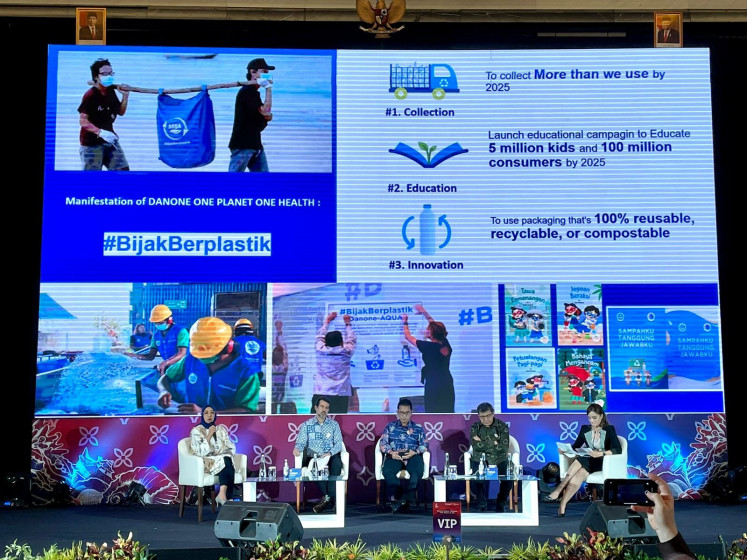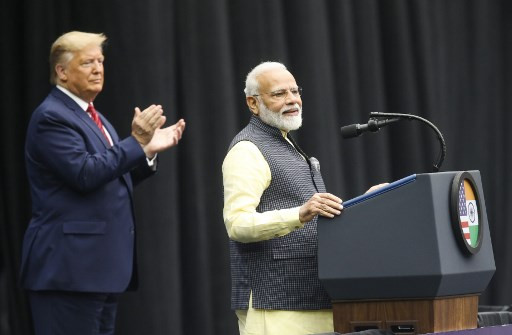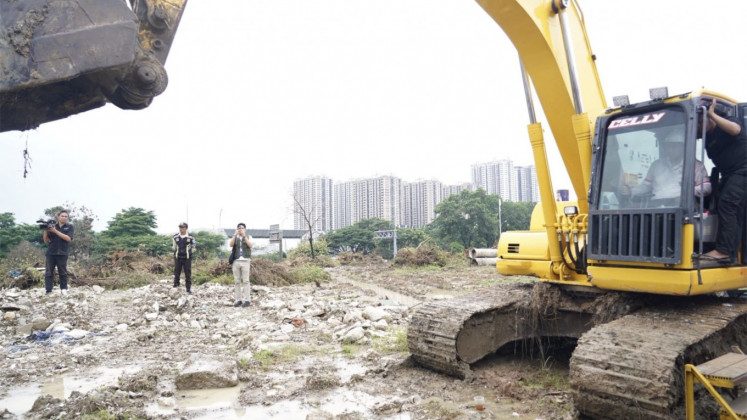Popular Reads
Top Results
Can't find what you're looking for?
View all search resultsPopular Reads
Top Results
Can't find what you're looking for?
View all search resultsWaste reduction and circular-economy acceleration to fight against marine debris
According to the World Bank, Indonesia generates approximately 7.8 million tonnes of plastic waste annually.
Change text size
Gift Premium Articles
to Anyone
A
ccording to the World Bank, Indonesia generates approximately 7.8 million tonnes of plastic waste annually. Moreover, the Environment and Forestry Ministry (KLHK) revealed that out of 68.5 million tonnes of waste, 11.6 million tonne were plastic waste (2021).
As the country with the second-most plastic waste in the world, Indonesia’s problem has become apparent in its communities. The enormous quantities of plastic waste have taken a toll on marine life, as animals often get entangled in the plastic waste and die. Waste has also clogged the oceans and waste choking rivers has deprived local communities of their source of food and water.
The amount of waste also contributes to one of the most frequent natural disasters to happen in the country: flooding. To curb the challenge of plastic waste and marine debris, the Indonesian government has set a target to reduce plastic waste in the ocean by 70 percent by 2025.
The Coordinating Ministry for Maritime Affairs and Investment together with the National Plastic Action Partnership (NPAP) and Directorate General of Waste, Waste and Hazardous Toxic Management (PSLB3) at KLHK recently collaborated and held Beating Plastic Pollution from Source to Sea, as a part of the series of Road to Group of 20 (G20) events. The event is aimed to promote the acceleration of a circular economy to lessen the output of waste in the country.
“Priority actions are needed in the entire waste management ecosystem including reducing plastic use, packaging innovation as well as recovery, recycling and collection in accordance with Minister of Environment and Forestry Regulation No. 75 of 2019 concerning the Roadmap for Waste Reduction,” said Novrizal Tahar, Director of Waste Management at KLHK.
Understanding the importance of collective actions between the government, individuals and all sectors of corporations, Danone-AQUA actively collaborates with multi-stakeholders to support the creation of waste management. The company opened the largest Integrated Waste Management Site (TPST) in Bali last year. The TPST, located in Samtaku Jimbaran, is built on an area of 5,000 square meters and has a capacity of 120 tonnes/day using a circular economy model and Zero Waste to Landfill.
. (Courtesy of Danone/.)The facility was visited by the guests at the Road to G20 pre-event to educate attendees about the importance of the development of waste-management infrastructure in Indonesia. It also showcases what the company has done to contribute to the problem of plastic waste in the country, in line with the value set forth by the Industry Ministry, which continues to encourage the FMCG industry and the recycling industry to implement a circular economy by setting standards.
"Danone-AQUA fully supports the government to ultimately help reduce plastic in the ocean. We recognize the complexity of the plastic-waste management problem, which can only be solved if all parties make a real and strong contribution; therefore, a multi-stakeholder approach is needed in the implementation of the Waste Reduction Roadmap KLHK,” said Vera Galuh Sugijanto, Danone Indonesia's vice president general secretary.
The company has also launched #BijakBerplastik movement in 2018, an initiative that supports the government's target in managing and reducing the amount of plastic waste that ends up in the oceans. The program works through three main foci: developing waste-collection infrastructure, educating consumers and the public and product-packaging innovation. In addition, Danone-AQUA ensures all of their packaging is 100 percent recyclable, reusable or compostable.
“To reduce the potential for waste generation, we also use the Reusable Gallon packaging, which we have been using since 1983 while continuing to maintain its quality. Through this reuse business model, currently 70 percent of our business has been fully circular in accordance with the government's vision of accelerating the implementation of a circular economy,” added Vera.
A study done by LPEM FEB UI noted that AQUA's reusable gallons have contributed to reducing the potential for waste generation of up to 770,000 tonnes and carbon emissions of up to 1.6 million tonnes per year. The World Bank also echoed the essentiality of collaborative efforts from the private sector to come together to solve challenges in waste management.
“The role of the private sector is very important in accelerating the development of solid-waste infrastructure in Indonesia. In accordance with the National Policy Action Partnership Policy Roadmap, it is important to strengthen and start implementing regulations regarding the reduction, redesign, reuse and recycling of waste from land sources to reduce the amount of waste released into the sea," concluded André Rodrigues de Aquino, the World Bank's Sustainable Development Program leader for Indonesia and East Timor.
This article was published in collaboration with Danone Indonesia.











